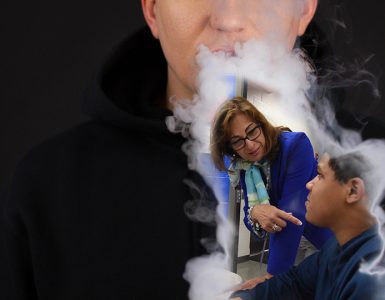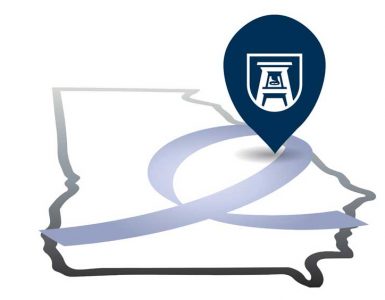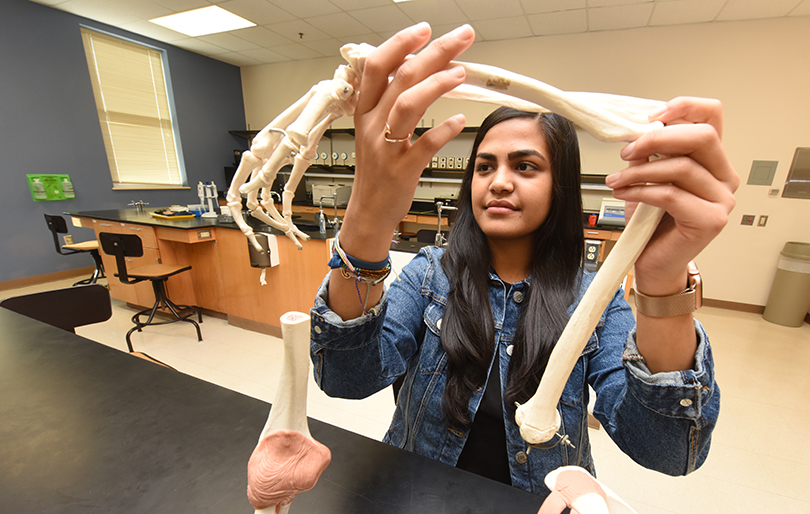
Name: Chandani Patel
Graduation Year: Spring 2020
College or School: Augusta University College of Science and Mathematics
Research Department: Department of Orthopedic Surgery
Name of Research Project: TREM-1: miRNA and Their Effects on Bone Loss in Traumatic Brain Injury Mouse Model
Why does this research matter? This research project is not only important for my personal growth as a future professional in the field of science; it is also applicable to the general population. This project is important in explaining why patients suffer bone loss and increased risk of fractures after traumatic brain injury such as concussions. The quality of life is seen to decrease with such injuries, and this project is aiming to elucidate the molecular mechanisms behind such symptoms.
What have you learned? From my experience, I have learned not only the concrete skills required to conduct the research itself, but also the hidden curriculum as well. I’ve learned professionalism, time management and persistence. Science doesn’t always work the way we intend for it to, and with all the setbacks I’ve faced, I understand this now more than ever. Most importantly, I’ve learned not to give up on reaching the end of the road, but just to look for another avenue.
What do you hope to do in the future? I hope to attend medical school and practice pediatric medicine in underserved areas.
How will this experience help you? The experiences I have gained while conducting research have helped me understand collaboration, form contacts and understand what it is truly like to be in the field. I have learned invaluable skills that have propelled me further towards my career goals. Although I do not plan to continue research as a career, I do find it to be one of the most rewarding experiences in my time as an undergraduate. The support and opportunities the CURS department has offered me have helped me achieve heights I did not know even existed.
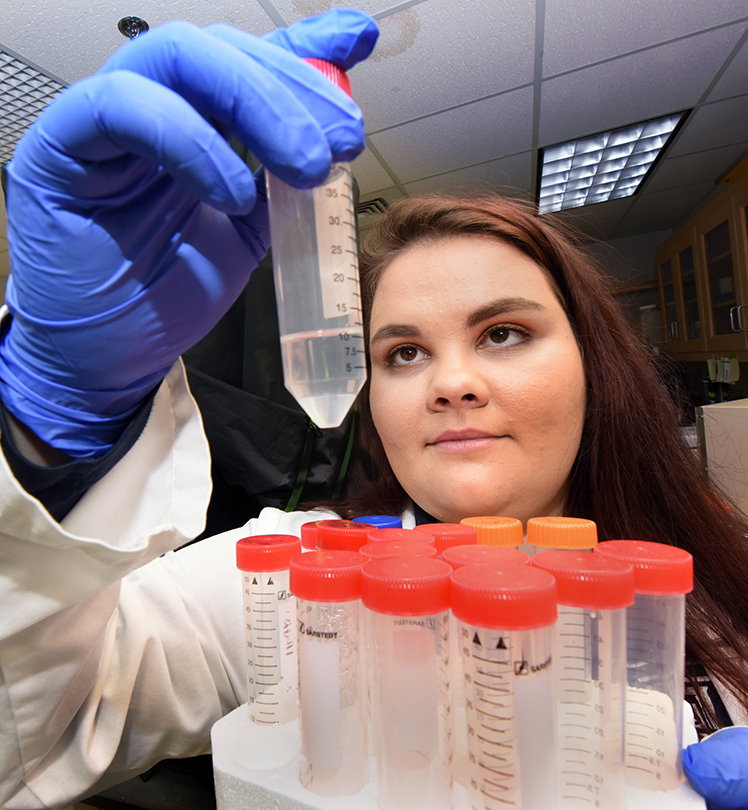
Name: Isabella Santana
Graduation Year: 2021
College or School: Augusta University College of Science and Mathematics
Research Department: Vascular Biology
Name of Research Project: TREM-1: A novel therapeutic target for retinopathy
Why does this research matter? Retinopathy of prematurity is the no. 1 cause for childhood blindness caused by abnormal blood flow and vessel in premature infants. With recent advances in keeping more premature infants alive, it is more important than ever that we develop a noninvasive and permanent treatment to retinopathy.
What have you learned? I have learned how to dissect and isolate a retina, as well as different staining and imaging procedures. So far, our preliminary data suggest targeting TREM-1 as an effective strategy for ameliorating the avascular area and neovascular tufts associated with retinopathy.
What do you hope to do in the future? I hope to attend Augusta University’s physician’s assistant program and to specialize in obstetrics.
How will this experience help you? This experience has definitely helped me throughout college, giving me experience in the lab that I can apply to my studies and vice versa. It also gives me the opportunity to develop my skills in the lab and to pursue my interest in research and education.
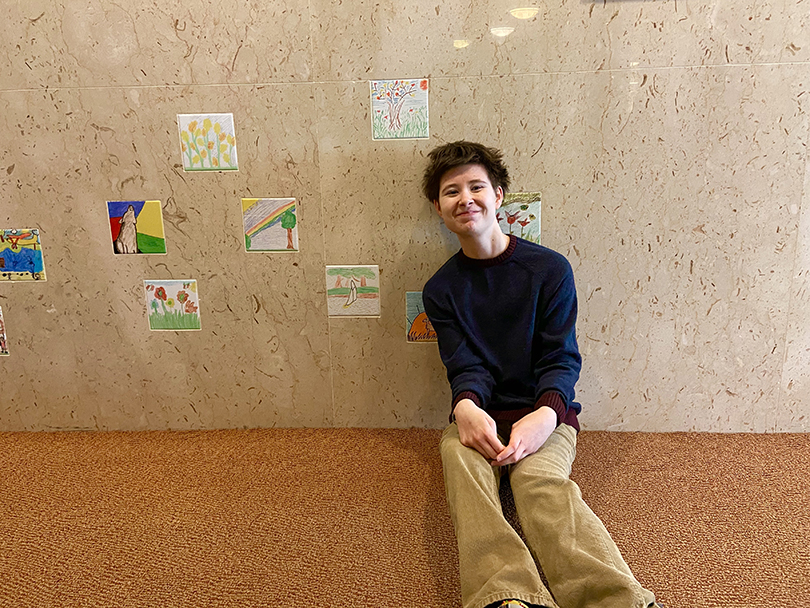
Name: Kit Jester
Graduation Year: Spring 2020
College or School: Augusta University College of Science and Mathematics
Research Department: Psychological Sciences
Name of Research Project: Examining the Occurrence of Conversion Disorder Diagnoses and Autism Among Adolescents and Young Adults in the Emergency Department
Why does this research matter? I was interested to see if there were cases in which individuals on the autism spectrum presented to the emergency department and were discharged with diagnostic codes both for their autism and a conversion disorder. This disorder tends to be the result of somatization, or the conversion of psychological stressors into real physical symptoms — neurological symptoms in this case — that do not align with an identifiable medical cause. Conversion symptoms may also be called “functional” symptoms.
My interest was primarily in adolescent and young adults, one of the populations in which this can often be seen. The emergency department was of interest for its quick pace, highly stimulating environment, and increased potential for miscommunication when faced with a patient on the spectrum. As one might imagine, stigma and stereotypes can also surround both those with autism and those with conversion disorder.
It is important to note that there currently is no existing literature linking these two diagnoses, so the entire topic was open for questions. We queried codes from the ninth and 10th versions of the International Classification of Diseases with the i2b2 database linked to the AU Health system.
In short, we did find some overlapping cases in which codes for autism and those for conversion disorders were both given together in the emergency department, and most of these were adolescents and young adults. My adviser, Dr. Donna Londino, and I hope this work may bring more awareness to these conditions and generate more interest in the topic.
What have you learned? This was my first time as primary investigator, and I have learned a lot! I posed a question with no insights offered by existing literature. My adviser and I also encountered a number of naysayers early on, but asking new questions is an important part of the research process. Once we narrowed our search and did actually see some coding overlap to confirm our suspicions, I felt much more confident in my approach. Hold your focus and know regardless of what is found (or not found), it has value.
Throughout the last couple years, I have also learned how much I enjoy talking with other undergrads about the research process and about my work. Now, when I encounter an interested student, I almost always point them to the CURS office first, especially if they are unsure where to begin. Then, I encourage them to talk to people — professors, other students, etc. Join a project or look into crafting your own; find a mentor; and begin.
What do you hope to do in the future? I look forward to examining this topic in more depth as I can. Career-wise, I am still weighing my options. Graduate school is where I plan to be once I can take care of some personal matters. I am interested in many topics, but most fall under the umbrellas of neuropsychology, health psychology, child development and the clinical neurosciences. I hope to make a decision by next fall.
How will this experience help you? Having this experience has been an invaluable step forward as I continue in my academic career. A number of faculty and students have expressed confidence in my work. These ideas will now be going places for further investigation, which is amazing to ponder. Having this experience has strengthened my connections and ability to work with people. My curiosity and creativity have also been reinforced. Moving forward, there will be many other ways I will apply what I have learned.


